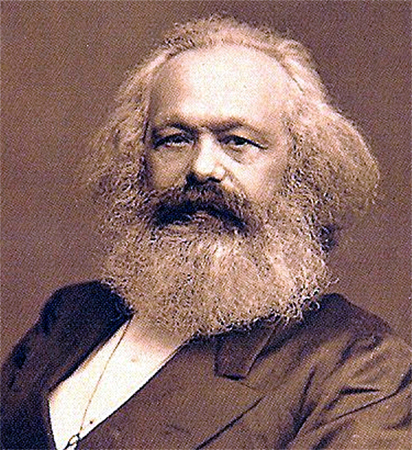| << Chapter < Page | Chapter >> Page > |

Karl Marx (1818–1883) was a German philosopher and economist. In 1848 he and Friedrich Engels (1820–1895) coauthored the Communist Manifesto . This book is one of the most influential political manuscripts in history. It also presents Marx's theory of society, which differed from what Comte proposed.
Marx rejected Comte's positivism. He believed that societies grew and changed as a result of the struggles of different social classes over the means of production. At the time he was developing his theories, the Industrial Revolution and the rise of capitalism led to great disparities in wealth between the owners of the factories and workers. Capitalism, an economic system characterized by private or corporate ownership of goods and the means to produce them, grew in many nations.
Marx predicted that inequalities of capitalism would become so extreme that workers would eventually revolt. This would lead to the collapse of capitalism, which would be replaced by communism. Communism is an economic system under which there is no private or corporate ownership: everything is owned communally and distributed as needed. Marx believed that communism was a more equitable system than capitalism.
While his economic predictions may not have come true in the time frame he predicted, Marx’s idea that social conflict leads to change in society is still one of the major theories used in modern sociology.
In 1873, the English philosopher Herbert Spencer (1820–1903) published The Study of Sociology , the first book with the term “sociology” in the title. Spencer rejected much of Comte’s philosophy as well as Marx's theory of class struggle and his support of communism. Instead, he favored a form of government that allowed market forces to control capitalism. His work influenced many early sociologists including Émile Durkheim (1858–1917).
Durkheim helped establish sociology as a formal academic discipline by establishing the first European department of sociology at the University of Bordeaux in 1895 and by publishing his Rules of the Sociological Method in 1895. In another important work, Division of Labour in Society (1893), Durkheim laid out his theory on how societies transformed from a primitive state into a capitalist, industrial society. According to Durkheim, people rise to their proper level in society based on merit.
Durkheim believed that sociologists could study objective “social facts” (Poggi 2000). He also believed that through such studies it would be possible to determine if a society was “healthy” or “pathological.” He saw healthy societies as stable, while pathological societies experienced a breakdown in social norms between individuals and society.
In 1897, Durkheim attempted to demonstrate the effectiveness of his rules of social research when he published a work titled Suicide . Durkheim examined suicide statistics in different police districts to research differences between Catholic and Protestant communities. He attributed the differences to socioreligious forces rather than to individual or psychological causes.

Notification Switch
Would you like to follow the 'Introduction to sociology' conversation and receive update notifications?